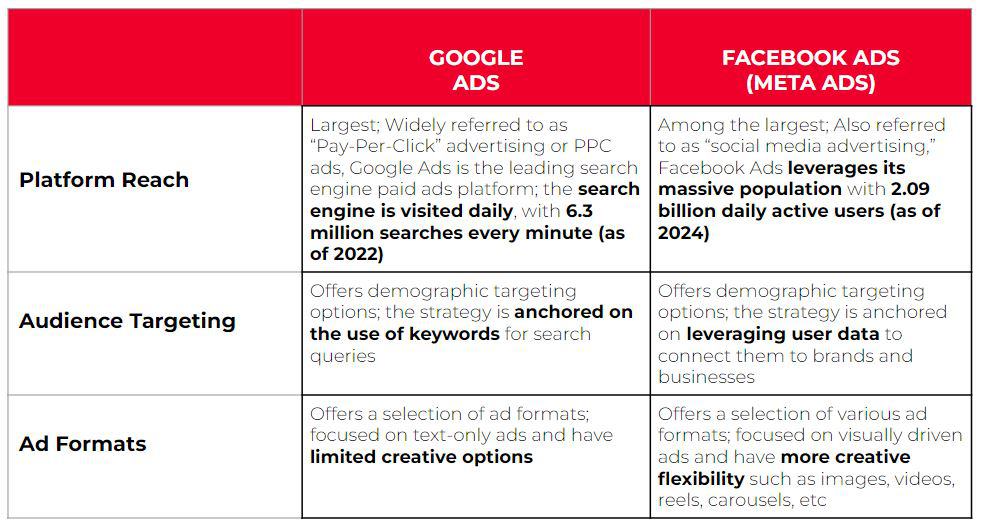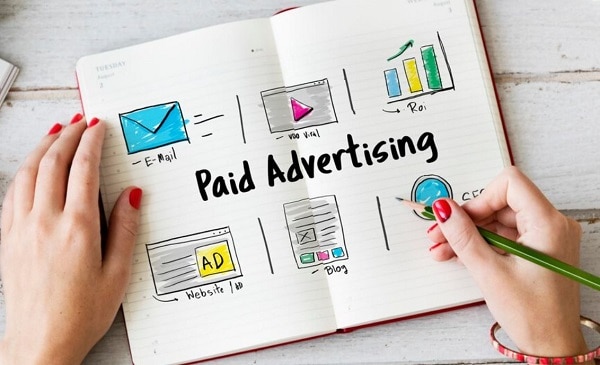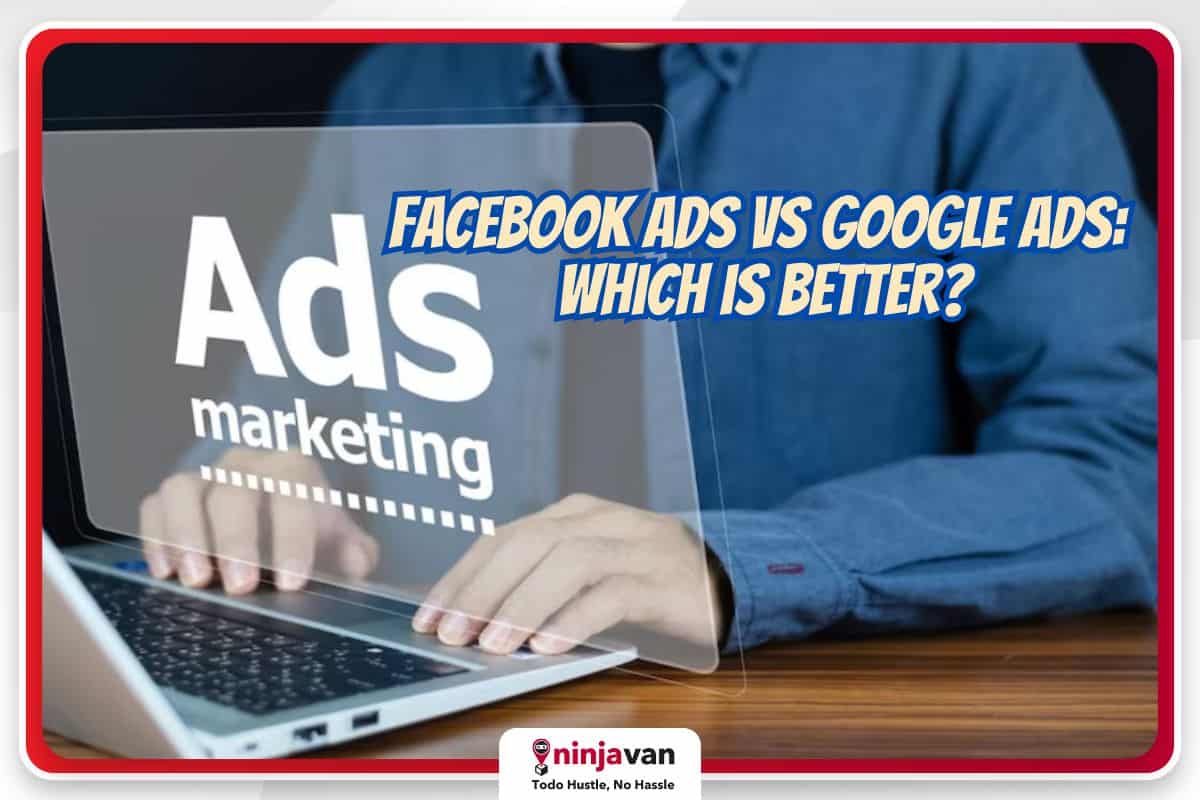TV commercials used to be all the rage, but businesses now have the opportunity of using online ads. And it makes perfect sense. Filipinos spend a lot of time (nine hours on average a day!) on the internet. But with all the strategies and options on hand, figuring out where to spend your advertising budget can be overwhelming.
You do have two big players in the advertising game to pick from: Google Ads and Facebook Ads for businesses. We’ll help you figure out which one will fit your business.
Why do you need paid ads for your business?
Paid ads serve as beacons for a user, guiding potential customers to your business.
Google Ads, for example, can help a brand reach its customers online through the Google search engine and drive visits to their web store. Facebook Ads (or “Meta ads”) can help a brand reach audiences across various social channels under the Meta platforms.
Google and Facebook’s platforms offer a targeted advertising approach that can help a business:
- Reach their desired audience
- Increase brand visibility
- Drive traffic to the business website
- Generate more sales
Paid advertising, such as Google Ads and Facebook Ads, makes it easier for your business to compete with big brands because it amplifies your message and lets you stand out in a crowded digital space.
#NinjaTip: Get shipping and logistics solutions tailored to your business needs. Ninja Van is your one-stop logistics partner to optimize your business for growth. Discover what we can do for your business.
What are the key differences between Facebook ads vs Google ads?
To help you choose between Google Ads and Facebook Ads for your business, we compare three important factors to consider in online advertising: the platform’s reach, audience targeting options and available advertising formats.

Also read: The Different Types of Facebook Ads You Should Know
What are Facebook ads?
Facebook ads are a cornerstone of social media marketing, allowing businesses to promote their products or services directly to users on the platform.
With over billions of active users, Facebook offers unparalleled access to a diverse audience. The platform applies user data and demographics to target ads effectively, ensuring that your message reaches the right people at the right time.
Here’s an overview of how the Facebook Ads process goes:
- Ad creation
- Audience ad targeting
- Ad auction
- Ad placement
- Ad delivery and optimisation
Advantages and disadvantages of Facebook ads
Advantages of Facebook Ads for businesses:
- Highly targeted. Facebook’s extensive user data enables precise targeting based on demographics, interests, behaviors and more.
- Engaging ad formats. Facebook offers different ways to present ads, including image ads, video ads and more, allowing for creative and visually appealing campaigns.
- Social interaction. Facebook ads encourage social engagement, allowing users to like, share and comment on ads, which can amplify your reach and increase brand awareness.
Disadvantages of Facebook Ads:
- Ad fatigue. With the sheer volume of content on Facebook, users may become desensitized to ads, leading to ad fatigue and decreased engagement over time.
- Limitations due to lack of search intent. Unlike Google, where users are actively looking for answers to their problems, Facebook users are usually in a passive browsing mindset, making it challenging to capture high-intent leads.
- Rising costs. As competition on the platform increases, the cost of advertising on Facebook may rise, especially for popular demographics or industries.

When to use Facebook Ads?
Facebook ads are ideal for businesses looking to build brand awareness, engage with their audience and drive social interaction. Social media platforms are consumer-oriented, so it’s effective for businesses with visually appealing products or services, such as fashion, collectibles, beauty or food.
What are Google ads?
Google ads (formerly known as “Google AdWords”) are the cornerstone of search engine marketing, allowing businesses to display ads on Google’s search results pages and partner sites. The platform targets users based on their search intent, capturing potential customers at the precise moment they’re actively looking for products or services like yours.
Here’s an overview of how Google Ads works:
- Keyword targeting
- Ad creation
- Ad auction
- Ad rank (quality score) and placement
- Ad display and targeting
- Performance tracking and optimisation
Advantages and disadvantages of Google Ads
Advantages of Google Ads for businesses:
- High intent targeting. Google ads target users based on their search queries, meaning they’re actively looking for solutions to their problems, making them more likely to convert to customers.
- Diverse ad formats. Google offers various ad formats, including text ads, display ads and shopping ads, catering to different business goals and objectives.
- Performance tracking. Google’s robust analytics tools provide detailed insights into ad performance, allowing businesses to track conversions, measure ROI and optimize campaigns for better results.
Disadvantages of Google Ads:
- Competitive bidding. Popular keywords on Google can be highly competitive, driving up the cost per click (CPC) and making it challenging for smaller businesses to compete.
- Limited visual appeal. Compared to Facebook ads, Google ads have limited visual appeal, relying primarily on text to convey your message, which may not be as engaging for some audiences.
- Ad blindness. With the rise of ad blockers and savvy internet users, there’s a risk of ad blindness, where users overlook or ignore ads altogether, reducing their effectiveness.

When to use Google ads?
Google ads are ideal for businesses looking for faster results, such as leads and conversions, in a limited amount of time.
It works best for brands with strategies focused on capturing high-intent leads like “buying” keyword phrases, and are particularly effective for businesses in industries with a clear search demand, such as e-commerce, travel or service-oriented offerings.
Google ads vs Facebook ads: Which is the better option for your business?
For SMEs and established e-commerce businesses looking to build brand awareness, engage with their audience and foster social interaction, Facebook Ads offers a compelling solution as it can stand alone or blend well with other organic and paid marketing strategies.
For businesses looking to capture high-intent leads and drive immediate conversions, Google Ads seems to be the recommended way to go, especially for larger enterprises with wider customer bases and high-volume sales targets.
The decision over Google ads vs Facebook ads ultimately depends on the nature of your business, target audience and advertising goals.

Use the right ad platform for your online business
Both Facebook Ads and Google Ads offer unique advantages and disadvantages, the key to success lies in understanding your audience, setting clear goals and leveraging the right ad strategy for your business.
Make informed decisions that drive meaningful results and contribute to the growth and success of your online business.

More tips to grow your online business:
5 Tips on How to Run Successful TikTok Ads
3 Viral Ads and What You Can Learn From Them
Discovery Commerce: Let Your Customers Find You






